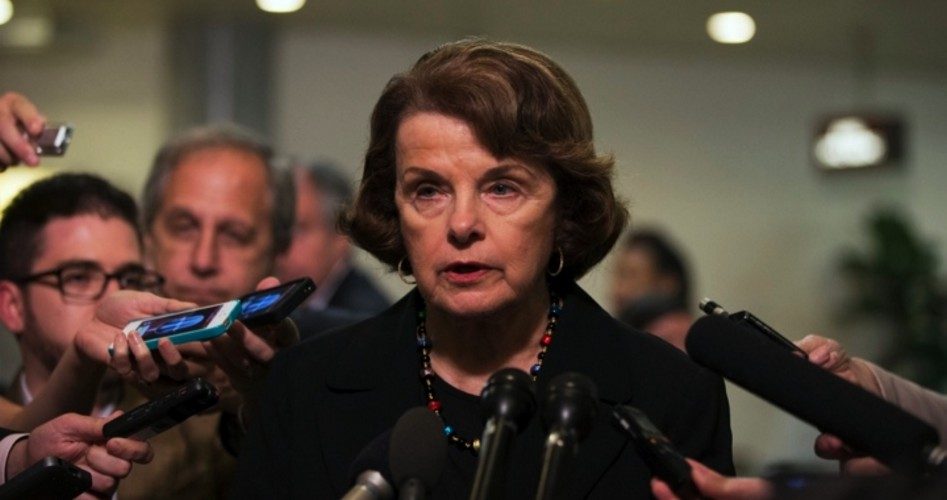
Following news accounts of how the government has been collecting and storing millions of phone call records, e-mail messages, and other forms of electronic communications every day, the chairman of the Senate Intelligence committee said Thursday greater protections are needed — for the government.
Following a closed-door meeting of senators with Director of National Intelligence James Clapper and Director of the National Security Agency General Keith Alexander, Committee Chairman Senator Dianne Feinstein (D-Calif., shown) said legislation would be introduced to limit access that private contractors have to the nation’s intelligence programs.
“We will certainly have legislation which will limit or prevent contractors from handling highly classified and technical data, and we will do some other things,” Feinstein said. Contractor access has become a major issue concerning government surveillance activity since Edward Snowden announced he was the one who gave classified documents exposing the NSA telephone monitoring and Internet search program called PRISM to the Washington Post and to the British publication The Guardian. Snowden, who fled from his home in Hawaii to Hong Kong to avoid arrest and prosecution, was an employee of Booz Allen Hamilton, a private tech company that has contracts with the Defense Intelligence Agency and the Central Intelligence Agency, in addition to the NSA. Private contractors supply much of the technological skill and infrastructure for the data-gathering and analysis programs, however, and it’s not clear how the 483,263 contractors with “top secret” security clearance would be able to work with the 791,000 government employees with that same clearance if their access to the secrets were limited. About a half-million other contractors held lower-level secret and confidential clearances, the New York Times reported.
“These are not just operators sitting at some computer console,” a senior intelligence official told the Times. “Oftentimes, the contractors develop the systems that they are running — they are frequently the innovative force. You want to think twice before you terminate that.”
Feinstein said the NSA on Monday will release information about the potential terrorist attacks that had been thwarted by its surveillance programs. She spoke to reporters following the closed-door session, standing with General Alexander, House Intelligence Committee Chairman Mike Rogers (R-Mich.), and the committee’s senior Democrat, C.A. “Dutch” Ruppersberger of Maryland.
“We have pledged to be as transparent as possible,” Alexander said. “I think it’s important that you have that information. But we don’t want to risk American lives in doing that. So what we’re being is very deliberate in this process so that we don’t end up causing a terrorist attack by giving out too much information.” The general declined to take questions from the reporters.
The agency has amassed, through PRISM and other programs, a huge database that includes the logs of nearly every domestic phone call made by Americans, along with e-mail and other communication data from Internet companies. According to the Foreign Intelligence Surveillance Act, as amended by Section 215 of the PATRIOT Act, the collection of such may be made without individual court orders if it is relevant to a national security investigation involving non-Americans in other countries. Rogers said grave damage has been done by the disclosure of the programs.
“The more we know, the more dangerous this situation becomes,” the Michigan Republican said. “People plotting to harm Americans have already begun changing methods to conceal their activities since the programs have become public,” he said.
Aside from the issue of privacy rights and Fourth Amendment protections against unreasonable searches and seizures, disclosure of the massive nature of the government surveillance of phone logs and Internet communications has raised questions about how effective it all is. Government surveillance activity appears to have increased dramatically since the 9/11 terrorist attacks for obvious reasons. But even before 9/11, intelligence officials had key 9/11 conspirators in their sights and the would-be 20th, Zacarias Moussaoui, in custody and failed to discover the plot. The CIA apparently lost track of or interest in one of the hijackers, Khalid Almihdhar, even though agents knew of his al-Qaeda connections since 1999. Almihdhar was living openly and undisguised in the United States from January 2000 until late in the year, returning to New York in September 2001. It may be that even before 9/11, the PATRIOT Act, and the creation of the Department of Homeland Security, intelligence officials had so much data on millions of innocent Americans that they lost sight of the real threats to our safely and security.
Perhaps we will learn more about the effectiveness of the government’s surveillance programs on Monday when the NSA informs us of terrorist plots that have been thwarted by them. “There are more than you think,” Feinstein told reporters.
Photo of Sen. Dianne Feinstein: AP Images



